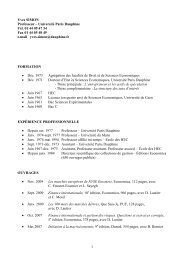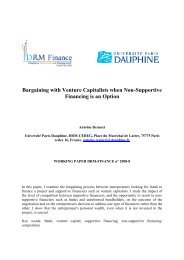Real Estate Brokers: Do they inflate housing prices? - CEREG
Real Estate Brokers: Do they inflate housing prices? - CEREG
Real Estate Brokers: Do they inflate housing prices? - CEREG
Create successful ePaper yourself
Turn your PDF publications into a flip-book with our unique Google optimized e-Paper software.
uyers in their thirties pay 1.76% more. This could be due to the fact that these categories ofbuyers lack experience and knowledge of the real estate market. The coefficients for the otherage trenches of buyers are not significant. Concerning the seller’s age, real estate brokerobtains higher selling price for their clients aged between forty and sixty nine. The increase isabout 2.8% for the first two categories and 2.4% for the last one. Surprisingly <strong>they</strong> manage toincrease by 4.7% the <strong>prices</strong> of homes sold by individuals over eighty years of age which mayresult from a confidence effect. Indeed, this could be ascribed to the fact that elderly personshave lived in their neighbourhood for a long time and may know the real estate agent closestto his house. It appears that young buyers spend more for their houses when working with abroker whereas older sellers benefit from engaging a broker.We next examine the impact of real estate agents on the socio-occupational activities ofbuyers and sellers. <strong>Real</strong> estate brokers have a positive impact on <strong>prices</strong> paid by buyers fromthe categories intermediate-grade occupations and other persons without occupational activitywith an increase of respectively 1.9% and 8.85%. The probit estimation showed that people inthe latter category where more likely to work with a broker and, when <strong>they</strong> do use a broker<strong>they</strong> pay much more for their homes with equal hedonic surface. We assumed that peoplebuying houses from this category were wealthy and had supposedly high opportunity costs.Therefore to avoid the annoyance of searching a house for a long time and negotiating withthe seller, <strong>they</strong> heavily rely on the real estate agent. <strong>Brokers</strong> may take advantage of this typeof client by raising the price of the houses in order to earn a higher money commission.Clerical (2.9%) and manual (5.5%) workers obtain higher <strong>prices</strong> for their homes by engaginga broker. Note that the coefficients for the RE variable in all the socio-occupationalsubsamples are positives with the exception of buyers falling into the managers and highergradeoccupations category.<strong>Real</strong> estate brokers do not appear to discriminate between matrimonial status and gender asmost RE coefficients are not significant. They seem to increase the <strong>prices</strong> of homes bothbought and sold by single men. <strong>Brokers</strong> also statistically manage to sell widows’ homes forhigher <strong>prices</strong>.22



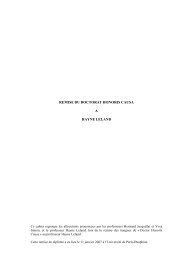
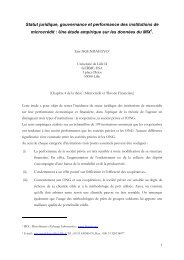
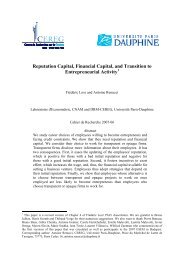

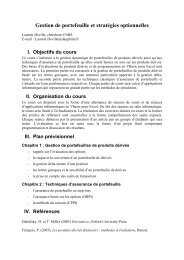
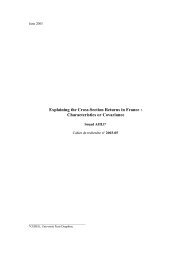
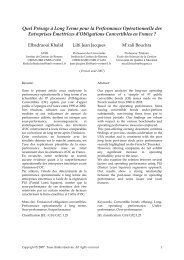


![& 6 ] ^ F ]^ - CEREG - Université Paris-Dauphine](https://img.yumpu.com/33326502/1/184x260/-6-f-cereg-universitac-paris-dauphine.jpg?quality=85)

